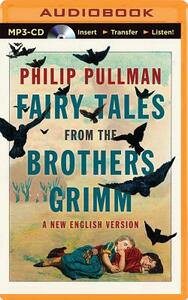Take a photo of a barcode or cover
They were fine. I think I expected something even more fanciful than the originals. But, in the end, it all seemed quite the same.
Całkiem zgrabny zbiór, ale trochę irytujące nieścisłości tłumaczeniowe, poza tym w niektórych baśniach widać aż zbyt wiele ingerencji Pullmana. Cóż, przynajmniej dobrze się dowiedzieć, że siostry Kopciuszka obcinały kawałki stóp, żeby zmieścić się w pantofelek, a Roszpunka była w ciąży.
I’ve forgotten the details of a lot of these fairytales (apart from the most popular) so it didn’t feel like much of a retelling to me (except the obvious uses of british colloquiums) but I still enjoyed these because who doesn’t love a good dark fairy tale? And then reading notes from the author about his thoughts on said fairy tales?
adventurous
dark
slow-paced
Plot or Character Driven:
Plot
Strong character development:
Complicated
Loveable characters:
N/A
Diverse cast of characters:
No
Flaws of characters a main focus:
Yes
I had a lot of fun reading this!
I love fairy tales and have a beautiful old copy of Grimms (with paper plates over the real pictures) so Philip Pullman had quite a lot to live up to!
Fortunately, I really enjoyed this edition. There were some tales I was unfamiliar with (different Grimms have different ones included) and some lovely old favourites. I also enjoyed Pullman's notes at the end of each tale, talking about the sources and different variations. Of the new-to-me tales, I particularly enjoyed Hans the Hedgehog - if you're unfamiliar with it, go and try it out, it's so wonderfully bizarre. Other favourites are Rapunzel, the twelve dancing princesses, the tale which King Lear took inspiration from, Briar Rose, the various relatives of our well loved Cinderella.. Lots of good stuff in there.
The issue I have with this book is: who is it for? Pullman is very clear in his introduction and further notes that fairy tales are different to other stories, in that the teller should be anonymous. There are no turns of phrase that let's you know it's Pullman, no stylistic features, very little description. These stories, simply, tell their stories. He is emulating Grimms as much as possible. Now, I understand the principle behind this idea, but it comes back to: who is he writing this for? If you want completely straight retellings of folk tales, then you can read any of the numerous additions of Grimms. Do we need another more modern version? I would argue: not really.
I have still given it four stars because I did enjoy reading it, but I would have enjoyed reading Grimms just as much. Modern versions of old tales need to be a bit different, have something different to say, something that makes them unique. Where is that here?
Fortunately, I really enjoyed this edition. There were some tales I was unfamiliar with (different Grimms have different ones included) and some lovely old favourites. I also enjoyed Pullman's notes at the end of each tale, talking about the sources and different variations. Of the new-to-me tales, I particularly enjoyed Hans the Hedgehog - if you're unfamiliar with it, go and try it out, it's so wonderfully bizarre. Other favourites are Rapunzel, the twelve dancing princesses, the tale which King Lear took inspiration from, Briar Rose, the various relatives of our well loved Cinderella.. Lots of good stuff in there.
The issue I have with this book is: who is it for? Pullman is very clear in his introduction and further notes that fairy tales are different to other stories, in that the teller should be anonymous. There are no turns of phrase that let's you know it's Pullman, no stylistic features, very little description. These stories, simply, tell their stories. He is emulating Grimms as much as possible. Now, I understand the principle behind this idea, but it comes back to: who is he writing this for? If you want completely straight retellings of folk tales, then you can read any of the numerous additions of Grimms. Do we need another more modern version? I would argue: not really.
I have still given it four stars because I did enjoy reading it, but I would have enjoyed reading Grimms just as much. Modern versions of old tales need to be a bit different, have something different to say, something that makes them unique. Where is that here?
I remember I bought this book in May 2016 after I arrived at the airport to pick up my mum only to find out her plane had been delayed for a long time. I don't remember exactly but it was at least an hour. All I had with me were my purse and car keys, so I had to get something to keep me occupied and found this book. I read two tales and put it aside, to read other books. I have no idea why. It is amazing.
I love fairy tales, I've read lots of them. I also really like Philip Pullman. It's like this book was made just for me. Pullman has picked 50 tales from the Brothers Grimm and written them in his own words. Despite them being rewritten, the tales ring so true to the original that it doesn't even feel like it's a modern rewriting. After each tale, there is a short explanation about its meaning, a list of similar stories from other tale writers and sometimes Pullman also explains if he's made changes to the original for storytelling purposes or gives you little fun facts about the tale.
If you've read anything by Pullman, you'll know he himself is a master storyteller. I've only read His Dark Materials, but I love the whole series and the other related books as well. The writing is so good, you just get sucked into the story. It's the same for these tales. I thought it would take me ages to read the book as it has over 400 pages, but it's just so compellingly written you have to keep reading.
As I said, I've read lots of fairy tales, but I discovered so many in Pullman's selection - it's very varied with some tales as famous as Cinderella and others I had never read. Grimm Tales is an absolute must-have for fairy tale lovers.
I love fairy tales, I've read lots of them. I also really like Philip Pullman. It's like this book was made just for me. Pullman has picked 50 tales from the Brothers Grimm and written them in his own words. Despite them being rewritten, the tales ring so true to the original that it doesn't even feel like it's a modern rewriting. After each tale, there is a short explanation about its meaning, a list of similar stories from other tale writers and sometimes Pullman also explains if he's made changes to the original for storytelling purposes or gives you little fun facts about the tale.
If you've read anything by Pullman, you'll know he himself is a master storyteller. I've only read His Dark Materials, but I love the whole series and the other related books as well. The writing is so good, you just get sucked into the story. It's the same for these tales. I thought it would take me ages to read the book as it has over 400 pages, but it's just so compellingly written you have to keep reading.
As I said, I've read lots of fairy tales, but I discovered so many in Pullman's selection - it's very varied with some tales as famous as Cinderella and others I had never read. Grimm Tales is an absolute must-have for fairy tale lovers.
Can't believe how long it's taken me to finish this! I suppose it's obvious that although I love the origin explanations, the fairytales for me just lack the wonderful depth that longer stories have. There are some fairly disturbing tales in here and it did make me realise how strange it is that we tell these fairy stories to children. This book did however pique my interest in fairytales to the point where I'm going to buy some of the recommended retellings, those that are longer and more in depth than these small snippets of magic.
My face when I learn King Lear is a rip off of a Grimm’s Fairy Tail.
adventurous
funny
hopeful
lighthearted
sad
fast-paced
Plot or Character Driven:
Plot
Strong character development:
N/A
Loveable characters:
Yes
Diverse cast of characters:
Yes
Flaws of characters a main focus:
N/A




